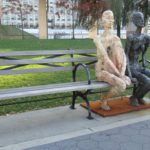Words cannot express the tragedy that has torn at our nation in the past few days.
We have watched a distraught Diamond Reynolds pleading with God for the life of her boyfriend, Philando Castile, who had just been shot multiple times by a police officer.
We have witnessed a desperate struggle between black Alton Sterling and two white officers, ending with Sterling’s point-blank shooting death.
We have seen five Dallas police officers gunned down by snipers during a Black Lives Matter protest.
And these are, we know, not isolated incidents. We have seen too many black men killed by officers sworn to keep the peace, and too often for reasons that seem to be little more than the color of their skin. We have seen too many police killed, apparently for no other reason than that they wore a uniform.
It seems almost impossible to write of these tragedies—this national tragedy—in words that are balanced and avoid assumption. Indeed, perhaps the most accurate assumption any of us can and should make is that in most cases (not all) there is both guilt and innocence on all sides. Yet even that statement seems to be a desperate stretch for balance in those instances where balance is clearly lacking.
In the midst of all this, social media lights up with hashtags and memes, opinions and arguments; some crying out for the innocents on their side and others shouting for judgment for the guilty on the other side. Pastors call for peace, politicians call for prayer or gun reform or immigration laws, mothers call for justice. And some, like me, feel that we ought to say something, do something… and yet we—I—feel helpless, impotent.
Yesterday I sat across a restaurant table from a young black man, just the second time I’ve met him. I realized (among other things) how much I have missed, having relationships almost exclusively with white people like me. And I realized how helpless I feel to do anything that might make a difference to the racial divide in my community, let alone my country.
Several times, as we talked about these killings and what it’s like growing up as a black man in America, my friend apologized for “bringing me down.” He needn’t have; I needed to hear him. It reminded me of my disabled friend, through whose eyes I have begun to see disabilities in a new light.
As I’ve reflected on our conversation, I’ve realized something else: I can do something. I can keep listening to my friend. And in the listening, I will learn, and that may be most important – at least for me. But in the listening I also give my friend a gift: the gift of being heard.
In times like this, it’s easy to jump on the hashtag bandwagon, to spout opinions, to show support for one side or another. But making a real difference isn’t easy, and it’s not accomplished by changing your profile picture.
If you’re wondering how to make a difference, then maybe the best thing is to find someone to talk with, to listen to—someone not like you: someone with different skin, a different religion, different beliefs; someone, perhaps, whom society says you should be at odds with. Go sit at a restaurant, a coffee shop, a park bench, and listen.

